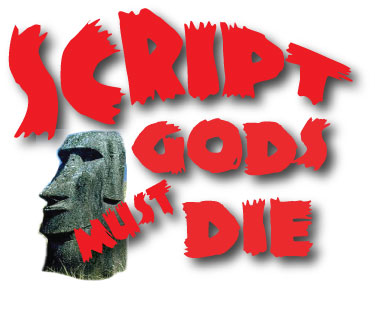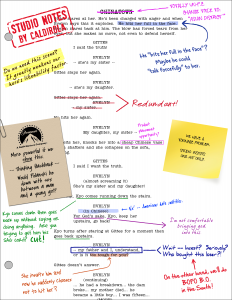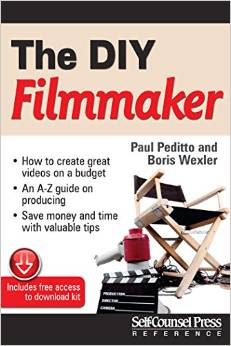 Today we’ll continue our Sampler Series with some of the best writing from Script Magazine in 2016. I’ve been writing for Script Mag for a couple years. You can check out my articles here. Today it’s other authors, some of the best people in the field. Hopefully it helps you on your way to writing your movie. Vamos!
Today we’ll continue our Sampler Series with some of the best writing from Script Magazine in 2016. I’ve been writing for Script Mag for a couple years. You can check out my articles here. Today it’s other authors, some of the best people in the field. Hopefully it helps you on your way to writing your movie. Vamos!
- ARE SCREENWRITING CONSULTANTS WORTH IT?
Here’s an honest point-counter-point on the subject of screenwriting consultants. If you read this blog you know I walk a fine line on the subject. I founded a blog named Script Gods Must Die because I had issues with some imposters in the market charging absurd amounts for their services, making a living at what’s been termed The Hope Machine. But look over to the column on the left and sure enough, I’m selling the same damn services! Hypocrisy! Maybe. I always considered myself a writer first, a teacher second. I’m no guru and make no claims to be. I’ve helped plenty of folks through the years and we all got bills to pay. My point being– seek honesty, folks. Tony Larussa was a marginal baseball player at best but went on to the Hall Of Fame as a Major League manager. It is possible to help people write a screenplay without having written Hangover 2, Craig. Here’s an article that brings up some of these points when considering shopping for an “expert” to help you.
“What makes a good script consultant?
Online, I’ve seen many people say they only want to learn from someone who has been a successful screenwriter themselves.
In the land of unicorns and leprechauns, that might just be possible. But guess what? Not all produced screenwriters make good consultants. Being a great consultant requires a degree of patience, hand holding, and tolerance to help elevate writing that is sometimes horrendous.
You also don’t have to be a produced writer to know what makes a good story. Many script consultants have read thousands of scripts. Not all writers have. The more you read, the more you learn how to be an effective storyteller.
Think about it. Those readers the studios use… the ones who decide the fate of your script. Did they have a screenwriting credit? Um, not so much. But they do know about the industry, what moviegoers’ expectations are, what their studio’s needs are, and what makes a solid story. Since they read an incredible volume of scripts each week, they know when a great story comes across their desk.
Having said that, if you can find a produced screenwriter who has the skill set to consult, even better. They’ve walked the walk and will hopefully give you the advice they wished someone had given them when they were starting out.”
- 11 TIPS ON THE HUSTLE
Let’s do one more from Jeanne, this time on navigating the Hollywood Hustle. Jeanne’s article gives 11 common sense methods that might help in your journey. Here’s a sample:
“Success is an illusion, with Hollywood being the ultimate palace of smoke and mirrors.
When you put pen to paper to craft your first script, you probably thought, “All I have to do is write it, sell it, and I’m IN!” Don’t be embarrassed to admit it. We all wore the same rose-colored glasses. Allow me to remove those for you…
I am blessed to know many professional writers now, and I am here to tell you, even after they sold their first scripts, the hustle never ended. EVER! Not a single one of them watched the money train pull up and an infinite stream of writing gigs pour in from their agents. They had to keep hustling on their own too.
Sure, maybe Aaron Sorkin doesn’t have to hustle anymore, but trust me, 99% of screenwriters inside the velvet ropes still do. The industry has its favorite handful of writers, and they ain’t gonna let just anyone into their treefort.
How do you set yourself apart? As I say often, there’s no single way to rise to the top. Sure, you need to be an amazing writer, but maybe more than that, you need to hone your hustle.
Some people are born hustlers. I remember a kid in kindergarten who worked that playground like a pro. People loved to hate him. Why? Because he always managed to get what he wanted, even if he had to be underhanded to do it.
No, I’m not suggesting you be a scumbag to succeed, but man, you do need a set of balls.
Don’t have any? Don’t worry. You can grow some.
- STUDIO SCRIPT NOTES: CHINATOWN
Freaking LOVE this series by Brian Caldirola! This is a page of mock Studio Script Notes on the #3 scripts on the WGA’s list of all-time greatest screenplays, Chinatown. The point, I think, is to encourage we Unknown Screenwriters by looking at how an all-time classic script might be marked up by mediocre and inane critiques– and c’mon, we’ve all been there. I’ll enclose the image here, but please go to Brian’s article.
- ALFRED HITCHCOCK AND THE MASTERING OF CINEMATIC TENSION
We teach Hitchcock’s “ticking bomb” example of cinematic tension at Columbia College Film School. They teach it at EVERY film school, around the country, around the world. It’s essential. Which is why I liked this analysis from Michael Lee posted in Script Mag on June, 2016. It’s refreshing to see a new take/interpretation on Hitchcock’s most famous example of how to elicit tension in a movie audience. Here’s a sample:
“Go back and listen to the Alfred Hitchcock On Mastering Cinematic Tension again. There are two important points to be made. First is when Hitchcock talks about the bomb going off and the audience getting ten seconds of shock. A lot of people have taken this to mean that ten seconds of shock is a less than optimal result. But Hitchcock never says shocking the audience is a bad thing. And this ties into the second point. What many people neglect about Hitchcock’s famous “ticking time bomb” discussion is that he immediately followed up with “The bomb must never go off.”
The bomb must never go off.
That changes quite a bit. It means that Hitchcock’s ticking time bomb model is about building anticipation for a blow that never lands. That’s why shock scenes cropped up so often in his work. Without them his pictures would all be a series of near misses. And that’s something that modern writers should keep in mind. Put aside one personal feelings concerning gore, jump scares, slasher movies and the modern horror genre. What Hitchcock really teaches us is that shock and suspense go hand in hand. Suspense is necessary because shock doesn’t last. It’s not inferior. In fact it is necessary because as also points out you can’t tease the emotions of the audience with a long suspense sequence without giving them some relief. But without some shocks there would be nothing for the audience to fear.”



